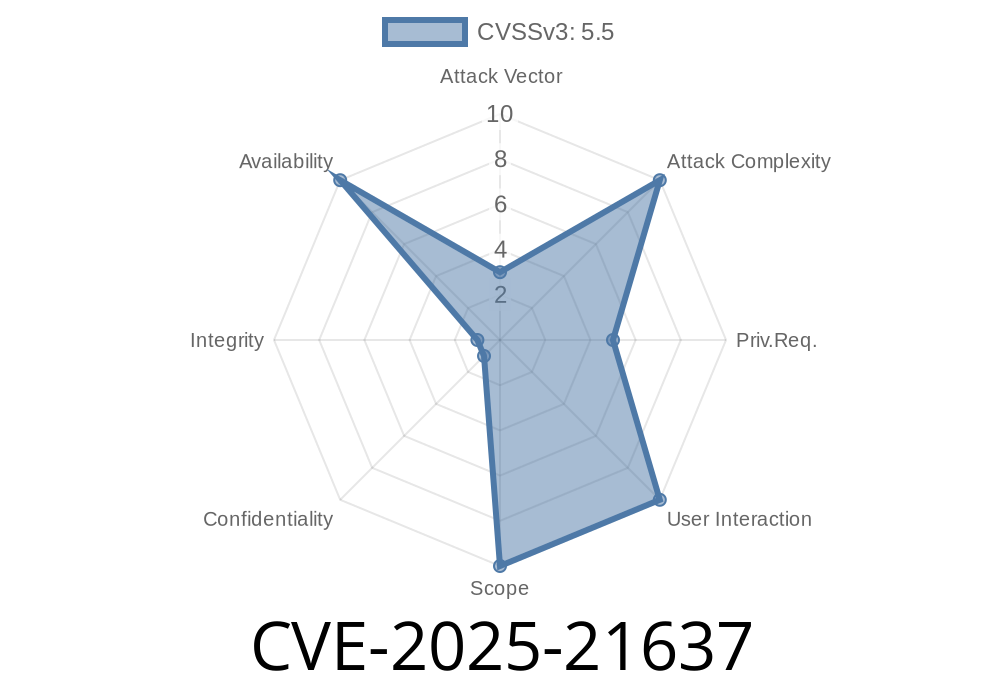A critical issue was found and fixed in the Linux kernel's handling of SCTP (Stream Control Transmission Protocol) under certain sysctl operations—a vulnerability tracked as CVE-2025-21637.
This vulnerability centers around how the kernel retrieves network namespace references, particularly through current->nsproxy. In specific situations, this can cause a null pointer dereference—leading to kernel crashes and potential denial of service.
Let’s break down what went wrong, how it could be abused, and how the Linux community fixed it. All explanations here are exclusive, plain-language, with code snippets, references, and even how you could have triggered this bug.
Accessing it without checking would cause a kernel Oops (crash) due to a null pointer dereference.
This issue was first brought up by the open-source fuzzing tool syzbot, using the acct(2) syscall, which detects kernel bugs through automated stress testing.
Here’s an abstracted snip based on the syzbot bug report and previous Linux code
struct net *net = current->nsproxy->net_ns;
...
// Using nsproxy this way is unsafe!
Why? Because current->nsproxy isn’t guaranteed to exist! If the process is in teardown (or has been manipulated in other ways), this pointer can be NULL.
Suppose userland code does this
prctl(PR_SET_PDEATHSIG, SIGKILL);
// Or quickly triggers exit in complex syscall combinations
The kernel, still somewhere in SCTP sysctl code, tries to access current->nsproxy->net_ns after the task began to exit. The pointer is zero. Boom: null pointer dereference and kernel crash.
Syzbot Finds It
Syzbot is a Google-backed fuzzing system that feeds weird/rare workloads into Linux kernels. As per [the bug posting][1], syzbot triggered this issue by playing with the acct(2) syscall.
> For reference: Linux kernel syzkaller dashboard
Why is This Dangerous?
1. Local Denial of Service: Any local user/script could crash the whole machine by exploiting this, using only standard sysctl or accounting syscalls.
2. Container Risk: Since network namespaces are often used for containers, this could allow an escape vector in very complex cases or at least crash container environments.
The Fix — Safer Access Without nsproxy
Kernel developers changed the code to access the necessary network namespace more directly and safely:
Original (problematic)
struct net *net = current->nsproxy->net_ns;
Fixed (safe)
struct net *net = container_of(table->data, struct net, sctp);
The table->data pointer is reliable within the sysctl context.
- container_of allows safely walking “up” from the specific SCTP sysctl data pointer back to the encompassing network namespace struct.
Exploit Example (Simplified)
Here’s a *conceptual* C snippet that can trigger similar kernel Oopses if running a vulnerable kernel (for education only!):
#include <sys/acct.h>
#include <unistd.h>
#include <stdio.h>
int main() {
acct("/dev/null"); // trigger acct syscall
// May interact with sysctl networking endpoints
// (needs to be combined with SCTP sysctl actions and task exit)
_exit(); // Exiting quickly to race kernel teardown
}
To really trigger it, syzbot used advanced syscall races and networking sysctl wrangling. The core danger: kernel code trusting current->nsproxy to always exist.
The Patch
See the actual commit for the fix:
- struct net *net = current->nsproxy->net_ns;
+ struct net *net = container_of(table->data, struct net, sctp);
References
- Syzbot Report and Linux Patch
- Linux Kernel Commit Fixing CVE-2025-21637
- Linux Sysctl SCTP Code
Summary
CVE-2025-21637 was a simple yet dangerous Linux kernel bug in network sysctl code. By trusting the current->nsproxy pointer to always exist, kernel code could crash if it was NULL. Anyone with local access, even unprivileged users, could abuse this—making it an important fix for security and stability.
> *Always keep your kernel updated—and never trust a kernel pointer to “just be there” if you can avoid it!*
[1]: Syzbot bug: https://syzkaller.appspot.com/bug?id=a5dc8e1c2cebbe7ed820c6e9ed1b5194ef73f1
*Got questions on Linux kernel exploits? Leave a comment or check out your distro’s security bulletins!*
Timeline
Published on: 01/19/2025 11:15:09 UTC
Last modified on: 02/27/2025 22:01:21 UTC
